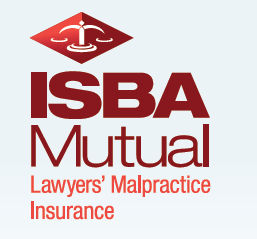ISBA Development Site
This website is for ISBA staff use only. All visitors should return to the main ISBA website.
This website is for ISBA staff use only. All visitors should return to the main ISBA website.
October 2015 • Volume 103 • Number 10 • Page 48
Thank you for viewing this Illinois Bar Journal article. Please join the ISBA to access all of our IBJ articles and archives.
Mistakes are a fact of life and law practice. Responding wisely and well can save your reputation, your practice, and maybe your lawyer soul.
 In a real dark night of the soul it is always three o'clock in the morning.
In a real dark night of the soul it is always three o'clock in the morning.
- F. Scott Fitzgerald
It's well into the evening and you're alone in the office, catching up on a few things. You're feeling tired, but virtuous: Is that the top of your desk you're seeing? Awesome! Staying late to take care of lingering tasks was a great idea, even if the greasy dinner you ordered in was not.
Then it appears. The Mistake. The one you made. It does not matter what it is - blown deadline, failure to file a document, violation of a rule - each area of practice has its own special traps and snares.
At first, you can't believe your eyes. Your face flushes, and you break out in a cold sweat. You would not, could not make such an error. Shock and disbelief give way to fear and shame as you become more and more certain you goofed up.
This dark night of the soul (hereinafter, the "DNOTS") comes to many lawyers. What you do in these fraught hours matters so much more than whatever it was you did to bring about this situation. In the words of Nikki Giovanni, "Mistakes are a fact of life. It is the response to the error that counts." Let's look at the proper response to this challenging test of your ethics, professionalism, and character.
Just don't do it
Do not ignore the problem. Do not lie about it or cover it up. Do not fabricate or destroy documents. Do not run away or consider suicide. In the cool light of day, these ideas are clearly foolish and wrong. In your DNOTS, you may hear their siren songs. Ignore them and steer a straight course.
Make sure you're (in the) wrong
Taking your first steps out of your DNOTS will require you to confirm your conclusion that you made a mistake, and if you did, determine whether it can be fixed. Resist the temptation to call the client immediately and confess your sin. It may turn out that you committed no error at all, or that an ethical, effective fix is at hand.
A fresh set of eyes will help you double-check your diagnosis. If you practice in a large firm, review the situation with your firm's general counsel or ethics committee. If you don't have those, take it to one of your firm's partners.
If you are a sole practitioner, consider contacting your professional liability insurer to see if a review might be available under a pre-claims assistance program (see "This is why you have insurance," below). An ethics hotline might be another useful resource.
Especially if you are a young associate, this may be one of the hardest things you have yet been called upon to do in your lawyer-life. I hope I don't need to tell you that this discussion should be face-to-face - don't even think of conducting it via email.
Request a meeting and prepare by gathering everything you need to tell the story concisely and completely. If you have ideas about a potential solution, bring them along, but do not delay the discussion while you search for a fix. At the meeting, explain the situation calmly and in a straightforward manner. Do not blame others or make excuses.1
This is why you have insurance
Let's assume your investigation reveals the worst: You did indeed make a mistake, no solution is available, and your client's case or matter will be seriously impaired because of your error. It is probably time to report this situation to your professional liability insurance carrier. And I say "probably" only because professional liability insurance policies are all different, and it is essential that you review the reporting requirements of your firm's own policy.
You know, of course, that you are obligated to timely report claims to the insurer.2 But your policy may also require you to report potential claims. Again, policies differ, but a typical definition of that term would be something like "circumstances of which the insured has knowledge that are reasonably likely to give rise to a claim."
The prospect of losing coverage for this situation, if it blows up into a claim, should be sufficient reason to report the potential claim to the insurance carrier without delay. This, after all, is why you buy insurance in the first place.
And no, the insurer is not going to dump you or jack up your premium just because you reported a potential claim. When insurers consider claims experience, they look at the insured's loss ratio, comparing premium dollars paid in to claims dollars paid out over some set period of time. Obviously, a claim on which nothing has been spent will not affect that ratio.
And there may be another good reason to report a potential claim, even if the policy merely permits, rather than requires, you to do so. Some insurers offer free pre-claims assistance to their insureds, in the hopes of helping them fend off claims or at least minimize their impact when they are made. For example, had you reported this situation sooner, the insurer might have been willing to assist in your initial evaluation of the suspected mistake and help you consider potential solutions.
Telling the client
The final step in surviving your DNOTS is to consider whether you have an ethical duty to disclose your mistake to your client. Rule 1.4 of the Illinois Rules of Professional Conduct requires a lawyer to "keep the client reasonably informed about the status of the matter" and to "explain a matter to the extent reasonably necessary to permit the client to make informed decisions regarding the representation."
In our scenario, you've determined that your error will seriously impair your client's rights, and is not fixable. Under these circumstances, your duty to disclose is fairly clear. Often, however, the ethical analysis is not so simple, and may require consultation with independent counsel. The ARDC's Ethics Inquiry Program (https://www.iardc.org/ethics.html) and the ISBA's Ethics Infoline (https://www.isba.org/ethics) can also provide assistance.
If disclosures are necessary, what do you need to tell your client? The answer to that question depends on the circumstances and applicable law. Obviously, your client needs to know the material facts regarding your error, e.g., "Your case has been dismissed because I failed to file a complaint before the statute of limitations expired." You should also advise your client that she may want to retain independent counsel to evaluate the impact of your error upon her matter.3
You're the soul survivor!4
These are the times that try men's souls.
- Thomas Paine
Mistakes are a fact of life and law practice, but discovering that you have erred can try your soul and tempt you to behave in an unethical or rash manner. Responding wisely and well to these difficult situations will not only satisfy your ethical obligations, but also save your reputation, your practice, and maybe your lawyer soul, too.

Karen Erger is vice president and director of practice risk management at Lockton Companies.
KErger@lockton.com